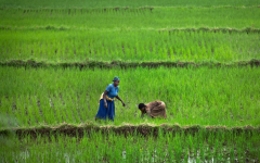Africa’s Economy Is Rising. Now What Happens to Its Food?
Africa’s Economy Is Rising. Now What Happens to Its Food?
January 22, 2015
"For decades, the economies of Africa were the world’s economic laggards. They aren’t anymore. Over the last decade, Africa’s per capita income has grown at a rate nearly identical to that of the rest of the world.
It’s reasonable to imagine that the continent is in the early stages of a trajectory that could mimic that of Latin America or, more ambitiously, parts of Asia. With the world experiencing one of the greatest extended reductions in poverty on record, Africa has finally become part of the story. A middle class is beginning to develop in West Africa, from Ghana and Nigeria down to Angola. Some severely poor countries, like Ethiopia and Liberia, are at least making rapid progress.
Along with Africa’s economic stirrings come many of the same questions that have confronted the rest of the developing world. And some of the most important revolve around food.
Will the economic growth prove lasting and broad enough to end the continent’s tragic famines? Will those Africans who today live almost entirely on starches like cassava be able to switch to a more varied and nutritious diet? How will farmers on the continent likely to suffer some of the worst consequences of climate change cope with it — and how can Africa’s rising food production avoid accelerating that climate change?
One of the biggest players in this area has become the Bill & Melinda Gates Foundation. It is better known for its efforts to reduce disease in Africa, but it has also spent more than $3 billion in grants on African agriculture. On Thursday, Mr. and Ms. Gates will be in Brussels to mark the 15th anniversary of their foundation and to announce their goals for the next 15 years. Among them: financing programs to help Africa feed itself.
Africa’s farmers today are vastly less productive than farmers elsewhere — getting less than one-fifth the yield on corn that American farmers do, for instance. The foundation plans to finance more scientific research, new programs to disseminate that research (especially to female farmers, who particularly struggle), better food storage and more mobile phones, all with the goal of lifting African agriculture. A more efficient agricultural sector, the Gateses write in their annual letter about their work, “can drive massive poverty reduction and improve life across the continent.”
Read more from New York Times.
